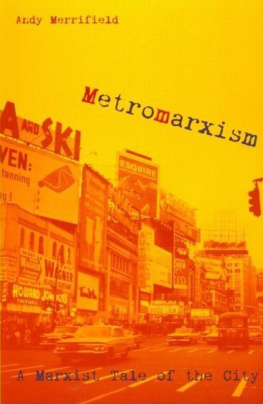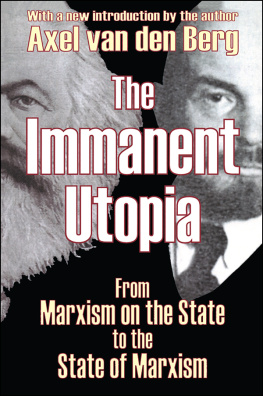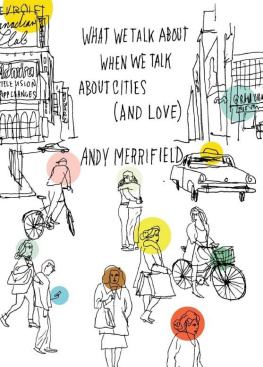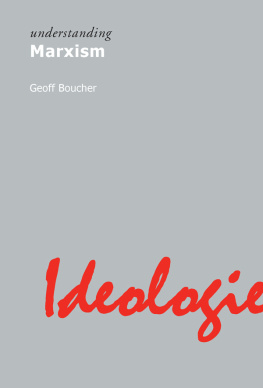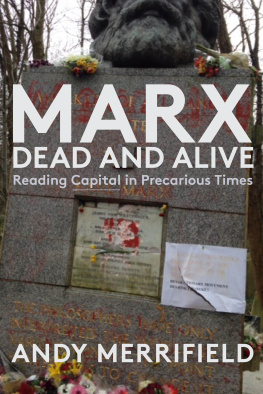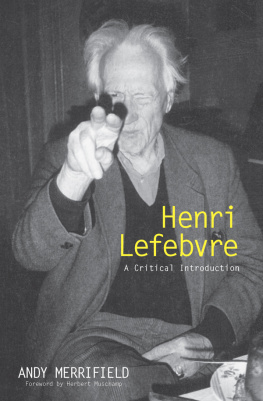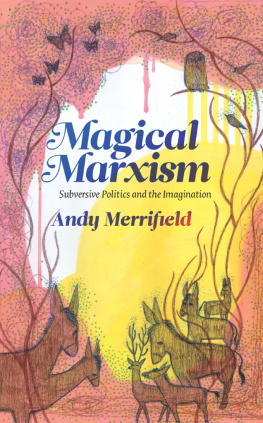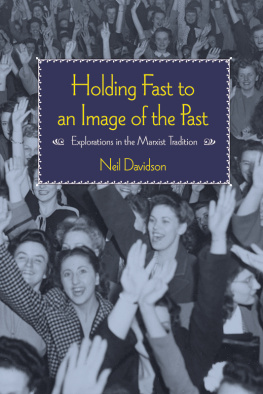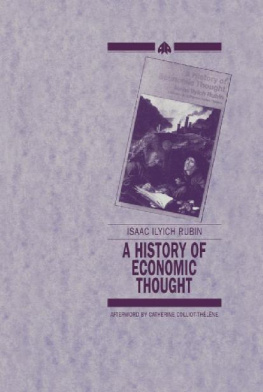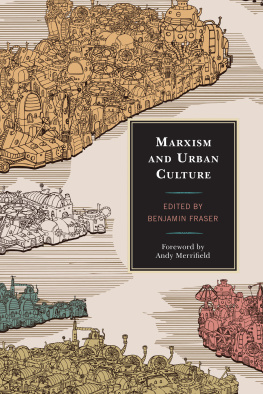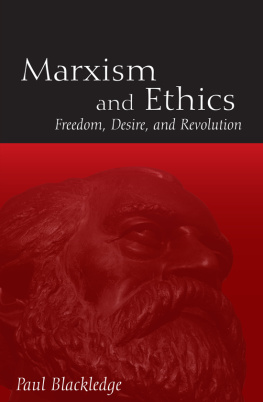Metromarxism
9780415933483
Metromarxism A Marxist Tale of the city
Size: 229 152mm Spine size: mm Color pages: Binding: Hardback
Metromarxism
A Marxist Tale of the City
Andy Merrifield
ROUTLEDGE
New York and London
Published in 2002 by
Routledge
270 Madison Ave,
New York NY 10016
www.routledge.com
Published in Great Britain by
Routledge
2 Park Square, Milton Park,
Abingdon, Oxon, OX14 4RN
www.routledge.co.uk
Routledge is an imprint of the Taylor and Francis Group.
Transferred to Digital Printing 2009
Copyright 2002 Routledge
All rights reserved. No part of this book may be printed or utilized in any form or by any elecronic, mechanical, or other means, now known or hereafter invented, including photocopying and recording, or any other information storage or retrieval system, without permission in writing from the publisher.
LIBRARY OF CONGRESS CATALOGING-IN-PUBLICATION DATA
Merrifield, Andy.
Metromarxism / by Andy Merrifield.
p. cm.
Includes bibliographical references and index.
ISBN 0-415-93348-X (hb) ISBN 0-415-93349-8 (pb)
1. Sociology, Urban. 2. Socialism. I. Title.
HT119 .M377 2002
307.76dc21 2002024668
Publisher's Note
The publisher has gone to great lengths to ensure the quality of this reprint but points out that some imperfections in the original may be apparent.
For Corinna
Contents
KARL MARX
FREDERICK ENGELS
WALTER BENJAMIN
HENRI LEFEBVRE
GUY DEBORD
MANUEL CASTELLS
DAVID HARVEY
MARSHALL BERMAN
You cannot say that I hold the present time in too much esteem; and if I do not always despair of it, it's only on account of its own desperate situation which fills me with hope Karl Marx to Arnold Ruge, May 1843
But for heaven's sake, let us not talk of quarts or gallons--let us take the story straight before us; it is so nice and intricate a one, it will scarce bear the transposition of a single tittle; and some how or other, you have got me thrust into the middle of it Laurence Sterne, The Life and Opinions of Tristram Shandy, Gentleman
ACKNOWLEDGMENTS
This book was easy and a joy to write. Dave McBride of Routledge helped make it easy with his typically prompt and eagle-eyed comments. Ditto my friends at Clark and in New York, who are unnamed here but not forgotten. Corinna and the guys came up trumps with the joy.
INTRODUCTION
Thinking about the city from the standpoint of a Marxist, and
about Marxism from the standpoint of an urbanist, is fraught with a lot of difficulties. For Marxist urbanists, this double movement runs the danger of tugging one in opposite directions or else having one fall between two stools. The present offering tries to reconcile these two political and intellectual imaginations. It's my hope that what emerges in this book will help sustain (and resuscitate) Marxist theory while enriching our critical understanding of the kind of city most of us inhabit today: the capitalist city. At any rate, the act of reconciling Marxism with urbanism isn't easy. Often the difficulties I've encountered haven't just been my own scholarly failingsevident as they are; for it's equally clear that, historically, Marxism's own relationship to urbanism has been pretty stormy. And urbanism, in turn, as a broad-based social scientific discipline and practice, has frequently eyed Marxism with a fair bit of skepticism. In an odd sense, the thinkers I've selected here, and whom I base each chapter around and give my own take on, have all suffered somehow from these respective pitfalls: their urbanism has been rejected because of its Marxist overtones, or else their Marxism has been officially denounced (or ignored) because of its urban (and spatial) overtones. For me, it's exactly this heterodoxy that makes each chosen thinker not only a better urbanist but also a more imaginative Marxist.
To some extent we can hold the grand old patriarchs, Karl Marx and Frederick Engels, responsible for Marxism's problematic marriage with the city. Neither man, after all, really got to grips with the urban; neither really spoke about the city as a definitive item within the laws of motion of the capitalist mode of production. The city was certainly there in their voluminous writings; and Engels wrote several tracts that could be considered urban, insofar as he emphasized the Great Town (and housing) question within the overall development of industrial capitalism. But the urbanism on show was more backdrop than center stage, more scenery than speaking part. To compound matters still, successive campaigns and regimes bearing the stamp Marxist have, during the twentieth century, been none too kind toward the city, or toward urban intellectuals. (Maybe with more foresight than irony, then, did Marx once tell a French socialist, I, at least, am not a Marxist!)
On this note, there are a few antiurban skeletons in the closet of Marxist insurrections. Here, variously, the city is portrayed as the site of corruption, of hell, of Mammon, and Sodom and Gomorrah, the world in which everything becomes nasty, brutish and short. The city had to be done in, taught a lesson, debourgeoisified; it contaminated real Marxism, unduly affected the halo of militant Marxist practice. Such thinking, to greater and lesser degrees, has indelibly scarred actually existing (or once existing) socialism. The 1949 Chinese Revolution was peasant based and later concentrated in smaller towns rather than bigger cities; ditto the Cuban revolution: Havana was long viewed as the power base of Fulgencio Batista's corruption and oppression. Daniel Ortega's Sandinistas looked upon Managua, Nicaragua, in similar light in 1979. And Pol Pot had it in for Phnom Penh, Cambodia. The Bolsheviks' antiurbanism was more complex. Their revolt was clearly urban based, yet their vision of socialism almost wanted to convert whole cities into giant factories, into colossal means of production and fodder for Five Year Plans. Old St. Petersburg fared especially badly here. Denounced by Soviet Moscow as the window on the West and the seat of obsolete czarist traditions, it fell victim to the party apparatchiki. They loathed its cosmopolitan urban culture, feared what it inspired, and thought it decadent (read: bourgeois). Hence, implicitly and explicitly, they asphyxiated a lot of what made cities great and urbanism vital.
Antiurban fervor, voiced in the name of militant Marxism, is evident in Regis Debray's classic insurgent text Revolution in the Revolution? but in an intriguing waynot least because it inverted the revolutionary logic of Marx and Engels. Portrayed as an authentic field guide to Fidel Castro and Che Guevara's thought, Debray's book aimed to revolutionize revolutionary practice itself by turning up the radical heat, by insisting that Marxism became an offensive, guerilla-like operation, flowing from the countryside to the citynot vice versa. His credentials on passing judgment were impeccable: Debray had studied with Louis Althusser at the cole Normale Suprieure, gripped a loaded rifle alongside Fidel and Che in the jungle, and served hard time awaiting a firing squad in a Bolivian jail. (He survived; in the 1980s, Debray joined Francois Mitterand's center-left government in France and has steadily continued on a rightward shift since.) In the Latin-American context, the city, for Debray, essentially put the brake on true revolutionary momentum. It was the empty head, largely incompetent, deaf to the plight of the rural guerilla and to peasant life. The rural hinterlands and mountain jungles were really the armed fist of a liberation front. The

